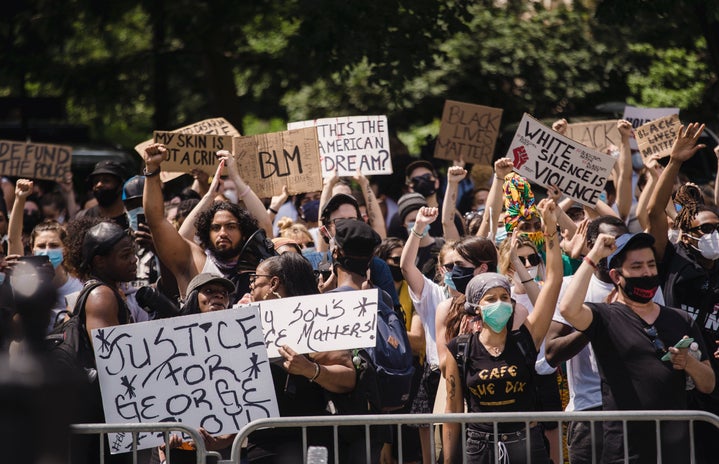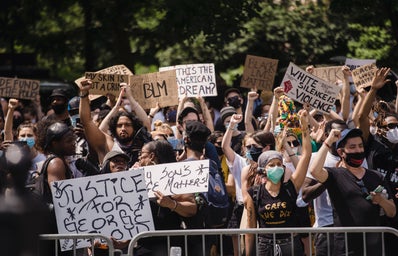Here comes the corporations, universities and campaigns being performative in their “care” about Black people for one month. When we look at Black History Month, which specifically centers Black “American” experiences in the United States, for white and Non-Black folks, there is still active participation and complicity in Anti-Blackness. Systems, institutions and facets of oppression are designed to exploit, dehumanize and uphold status quos. Therefore, what does it say when white and Non-Black folks are more concerned with their ego and “guilt” over actually doing something to address, dismantle, betray and abolish white supremacy? It should be known and very clear that no white or Non-Black person should be gaining profits or clout off of producing content about Black History Month. As Black experiences and communities are being centered, there must be the recognition for folks to stay in their place and recognize the importance of their “feelings” not being something that is center stage. As systems of oppression persist, Black folks are not free. So, what should white and Non-Black people celebrate for? The energy should be invested more in the work and collective fight for Black liberation where Black folks — especially those with additional oppressed identities — are being unapologetically centered. White supremacy is in many faces, forms and appearances. It also goes without saying that colorism is white supremacy. Colorism is twenty-four seven and is violence. If you are using your platform to center the same Light-Skinned Black folks, that is Anti-Blackness. When looking at the histories of certain Black movements or how activism in Black communities is discussed, such comes from a classist and colorist lens. Be mindful of who you platform and also be prepared for the fact that nothing you do is above reproach or critique. When you speak over Black folks, that is violence. When you erase Dark-Skinned Black folks, that is also violence. Many of you enforce respectability and desirability politics which are ways to continue the platforming and practice of white supremacist beauty standards while only centering those who are considered to be palatable. When it is said to support and center all Black folks, such always includes Black folks who are Dark-Skinned, Poor, Fat, Queer, Trans, Non-Binary, Disabled and Neurodivergent — especially those with intersections of these identities and more. It’s either all of us or none at all.
What I have noticed in academic and social spaces is the idea that Black folks have to be mindful of our tone or how we communicate things. False. This tactic is specifically used by white and Non-Black folks of color to gaslight Black folks and communities — especially Black women and femmes — when there is rightful pushback and critique of the ways Anti-Blackness and white supremacy permeate and are a part of the foundation of a space. Black folks do not owe you respectability, niceness or lessening what we want to say just to make you “comfortable.” There is nothing comfortable about white supremacy, Anti-Black violence or Black genocide. Your fragility and ego have to take a backseat. During this time and in general, many white and Non-Black folks believe that it is appropriate to flood Black folks’ DMs or ask us in spaces about things pertaining to race. This intruding on boundaries and lack of respect for the time of Black folks also speaks to a sense of entitlement when it concerns these conversations. It is not the job of Black folks to educate you. It is on you, as a white or Non-Black person, to engage in that education and be accountable.
There have been many excuses about folks not being “aware” and it is crucial to address this response as white and Non-Black people of color have the privilege to not be aware and to not educate themselves. Black folks across the diaspora have specific experiences that require specificity when we are addressed, which is why terms like “BIPOC” are harmful. When you lump Blackness, Black experiences and Black histories into generalizations or sameness, then there is the dismissing of the direct, connected and brutal systems of oppression that continue Black genocide. That term also purposefully others Black folks while ignoring the layers and issues of oppression that continue to specifically impact us. If you consider a Black person holding you accountable as an “attack” then maybe evaluate how you are the problem. Perhaps consider that tone policing and white egotism are parts of how you scowl at you being checked for your Anti-Blackness. When systems of violence continue to impact Black communities in devastating ways, you do not get to dictate to any of us how to go about our liberation.
The only things white and Non-Black people of color need to be doing this month are opening their purses, sharing mutual aid and crowdfunding resources while also taking upon themselves to grow up and fully immerse themselves in their own education. To extend it further, it is not just about “education” or “learning.” What is it that you’re actually doing? What action plans are you committed to? Are you supporting Black people 24/7 or just during a month? If you are under the notion that February is the only time to center Black folks, specifically, Black “Americans,” then such is problematic and harmful. Hold yourselves and others accountable while recognizing that the things you do commit yourself to are aspects and actions you owe to Black communities. If you are not Black, you do not get to dictate what is Anti-Black or what is not, and you certainly do not have the license to step into our affairs by thinking that sharing your opinions is ever appropriate. Our humanity is not your redemption arc. You do not deserve access to us, so respect those boundaries, do the work and reckon with your roles in Anti-Black systems. Supporting and protecting Black folks is supposed to be 365 days every year. That is less than the bare minimum. Get to work.
Stay out of Black people’s business.


